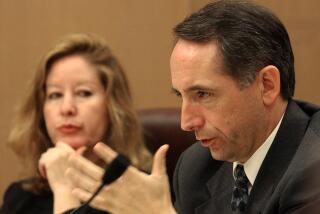HP Exec Seeks to Mend Fences
- Share via
Battling to keep her job, Hewlett-Packard Co. Chairwoman Patricia Dunn tried Friday to defuse the uproar over a company-ordered investigation that relied on a potentially illegal ruse to obtain the personal phone records of fellow directors and journalists.
In her first interviews on the matter, Dunn described the tactics as “absolutely appalling” and “embarrassing” and said the board “certainly had no idea” of the privacy breaches. But she defended the need to pursue the probe to plug a leak on HP’s board.
“I serve at the pleasure of the board,” said Dunn, 52, who is paid $300,000 a year by HP. “I totally trust their judgment. If they think it would be better for me to step aside, I would do that. But a number of directors have urged me to hang in there.”
She declined to say how many of HP’s nine other directors support her.
Dunn has come under fire for her handling of the investigation, which the board initiated after leaks to the media in the run-up to the ousting of Chairwoman and Chief Executive Carly Fiorina in February 2005.
California Atty. Gen. Bill Lockyer is examining whether the Palo Alto company’s probe was legal, and the Securities and Exchange Commission has asked HP for information.
HP said it had not been subpoenaed by Lockyer.
The Federal Communications Commission also has taken the first step toward opening an investigation by sending a letter of inquiry to AT&T; Inc., the source of the personal phone records obtained by HP. In a letter sent late Friday, Sen. Richard J. Durbin (D-Ill.) asked U.S. Atty. Gen. Alberto R. Gonzales to review whether HP’s investigation broke any federal laws.
Viet Dinh, a lawyer for Thomas Perkins, the Silicon Valley venture capitalist who quit HP’s board in May in protest over the leak investigation, said his client had asked federal prosecutors to review the HP probe. Perkins also made enforcement referrals to the FCC and the Federal Trade Commission, Dinh said.
Investigators reportedly used Social Security numbers of the people involved to trick phone companies into turning over telephone records. The practice is known as “pretexting.”
Dunn said one of her top priorities when she became HP’s chairwoman was to ferret out the source of board leaks.
HP has said director George Keyworth was the source of leaks to the media of specific details about the company’s strategy and boardroom deliberations.
“This was a person who had been a habitual long-term leaker,” Dunn said of Keyworth, who couldn’t be reached Friday for comment.
HP Chief Executive Mark Hurd, in his first public remarks on the issue, told employees in an e-mail that the board had a history of leaking information that “needs to be resolved.”
“Clearly things have happened here that are unacceptable,” Hurd said. “We will continue to gather and review all the relevant facts. I can assure you we will get to the bottom of this and take appropriate action.”
All nine reporters targeted in HP’s pretexting have been identified by their news organizations. They are Peter Burrows, Ben Elgin and Roger Crockett of Business Week; Pui-Wing Tam and George Anders of the Wall Street Journal; John Markoff of the New York Times; and Dawn Kawamoto, Tom Krazit and Stephen Shankland of CNet Networks Inc.’s News.com.
The personal phone records of Shankland’s father, Thomas, a physicist in New Mexico, were also compromised, according to CNet. It’s unclear why HP was interested in Thomas Shankland’s records, but his inclusion indicates that the pretexting extended beyond HP directors and journalists.
Dunn declined to say Friday how many people were targeted.
“If, as it appears, the rights of any of our reporters were violated, we will pursue whatever legal recourse is available to us,” a New York Times spokeswoman said. CNet said it was seeking “a full accounting of all the actions taken” from HP.
The prospect of criminal charges may distract Hewlett-Packard from a turnaround being led by Hurd. The company has topped analysts’ profit estimates in every quarter since he took over in April 2005, and it reported higher earnings and sales in the most recent period. He is cutting 15,300 jobs and using those savings to undercut PC market leader Dell Inc. on price and boost profitability.
Shares of HP, up 28% this year before the controversy became public, fell less than 1% this week. They rose 75 cents Friday to $36.17.
*
The Associated Press, Bloomberg News and Reuters were used in compiling this report.






